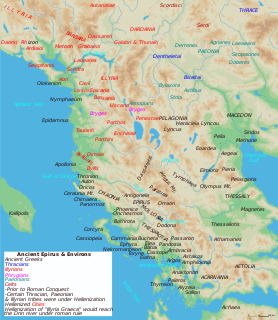
A throne is the seat of state of a potentate or dignitary, especially the seat occupied by a sovereign on state occasions; or the seat occupied by a pope or bishop on ceremonial occasions. "Throne" in an abstract sense can also refer to the monarchy or the Crown itself, an instance of metonymy, and is also used in many expressions such as "the power behind the throne". The expression "ascend (mount) the throne" takes its meaning from the steps leading up to the dais or platform, on which the throne is placed, being formerly comprised in the word's significance.

Opuntian Locris or Eastern Locris was an ancient Greek region inhabited by the eastern division of the Locrians, the so-called tribe of the Locri Epicnemidii or Locri Opuntii.

Thronion or Thronium was a Greek city of the Euboians and Locrians in Epirus, near Amantia. It is believed to lie somewhere to the south of Vlorë, between the Shushicë River and the sea. It was to have been founded after the Trojan War by the Abantes of Euboea and the inhabitants of the Locrian Thronium. It was taken at an early period by the inhabitants of the neighbouring town of Apollonia, and annexed to their territory, as appears from an epigram inscribed on a dedicatory offering of the Apolloniatae at Olympia.

Game of Thrones is an American fantasy drama television series created by David Benioff and D. B. Weiss. It is an adaptation of A Song of Ice and Fire, George R. R. Martin's series of fantasy novels, the first of which is A Game of Thrones. The show is filmed in Belfast and elsewhere in Northern Ireland, Canada, Croatia, Iceland, Malta, Morocco, Scotland, Spain, and the United States. The series premiered on HBO in the United States on April 17, 2011, and will conclude with its eighth season, which will premiere on April 14, 2019.
The Abantes or Abantians were an ancient Greek tribe and specifically an Ionian one. Their home was Euboea.

Emilia Isabelle Euphemia Rose Clarke is an English actress. Clarke studied at the Drama Centre London, appearing in a number of stage productions, and starring in a theatre production by the Company of Angels. After making her screen debut in a short film, her television debut came with a guest appearance in an episode of the British soap opera Doctors in 2009. The following year, she was named as one of the UK Stars of Tomorrow by Screen International magazine for her role in the Syfy film Triassic Attack (2010).

The first season of the fantasy drama television series Game of Thrones premiered on HBO on April 17, 2011 in the U.S. and concluded on June 19, 2011. It consists of ten episodes, each of approximately 55 minutes. The series is based on A Game of Thrones, the first novel in the A Song of Ice and Fire series by George R. R. Martin, adapted for television by David Benioff and D. B. Weiss. HBO had ordered a television pilot in November 2008; filming began the following year. However, it was deemed unsatisfactory and later reshot with some roles recast. In March 2010, HBO ordered the first season, which began filming in July 2010, primarily in Belfast, Northern Ireland, with additional filming in Malta.

The second season of the fantasy drama television series Game of Thrones premiered in the United States on HBO on April 1, 2012, and concluded on June 3, 2012. It was broadcast on Sunday at 9:00 pm in the United States, consisting of 10 episodes, each running approximately 50–60 minutes. The season mostly covers the events of A Clash of Kings, the second novel of the A Song of Ice and Fire series by George R. R. Martin, adapted for television by David Benioff and D. B. Weiss. HBO ordered the second season on April 19, 2011, which began filming in July 2011, primarily in Ireland, Northern Ireland, Croatia and Iceland.

The third season of the fantasy drama television series Game of Thrones premiered in the United States on HBO on March 31, 2013, and concluded on June 9, 2013. It was broadcast on Sunday at 9:00 pm in the United States, consisting of 10 episodes, each running approximately 50–60 minutes. The season is based roughly on the first half of A Storm of Swords. The series is adapted for television by David Benioff and D. B. Weiss. HBO renewed the series for a third season on April 10, 2012, nine days after the second season's premiere. Production began in July 2012. The show was filmed primarily in Ireland, Northern Ireland, Croatia, Iceland and Morocco.

The fifth season of the fantasy drama television series Game of Thrones premiered on HBO on April 12, and concluded on June 14, 2015. It was broadcast on Sunday at 9:00 pm in the United States, consisting of 10 episodes, each running approximately 50–60 minutes. The season primarily adapts material from A Feast for Crows and A Dance with Dragons, the fourth and fifth novels in George R. R. Martin's A Song of Ice and Fire series, though it also uses elements from the third novel, A Storm of Swords, as well as the upcoming sixth novel The Winds of Winter. It also contains original content not found in Martin's novels. The series is adapted for television by David Benioff and D. B. Weiss.

The sixth season of the fantasy drama television series Game of Thrones premiered on HBO on April 24, 2016, and concluded on June 26, 2016. It consists of ten episodes, each of approximately 50–60 minutes long, largely of original content not found in George R. R. Martin's A Song of Ice and Fire series. Some story elements were derived from the novels and from information Martin revealed to the show-runners. The series was adapted for television by David Benioff and D. B. Weiss. HBO ordered the season on April 8, 2014, together with the fifth season, which began filming in July 2015 primarily in Northern Ireland, Spain, Croatia, Iceland and Canada. Each episode cost over $10 million.

The seventh and penultimate season of the fantasy drama television series Game of Thrones premiered on HBO on July 16, 2017, and concluded on August 27, 2017. Unlike previous seasons that consisted of ten episodes each, the seventh season consisted of only seven. Like the previous season, it largely consisted of original content not found in George R. R. Martin's A Song of Ice and Fire series, while also incorporating material Martin revealed to showrunners about the upcoming novels in the series. The series was adapted for television by David Benioff and D. B. Weiss.

The eighth and final season of the fantasy drama television series Game of Thrones, produced by HBO, is scheduled to premiere on April 14, 2019. Filming officially began on October 23, 2017, and concluded in July 2018.
Scarphe or Scarpheia (Σκάρφεια) was a town of the Epicnemidian Locrians, mentioned by Homer in the Catalogue of Ships in the Iliad. According to Strabo it was 10 stadia from the sea, 30 stadia from Thronium, and a little less from some other place of which the name is lost, probably Nicaea. Moreover, Scarphe was reported to be occupying the territory of Augeiae, which had disappeared by his time. It appears from Pausanias that it lay on the direct road from Elateia to Thermopylae by Thronium, and likewise from Livy, who states that Lucius Quinctius Flamininus marched from Elateia by Thronium and Scarpheia to Heraclea. It was also the site of the Battle of Scarpheia in 146 BCE. Scarpheia is said by Strabo to have been destroyed by an inundation of the sea (tsunami) caused by an earthquake in 426 BCE, but it must have been afterwards rebuilt, as it is mentioned by subsequent writers down to a late period, including Pliny the Elder, Ptolemy, Hierocles, Stephanus of Byzantium, and the Geographer of Ravenna. Scarpheia is also mentioned by Lycophron, Appian, and Pausanias.
The Boagrius or Boagrios, also called Manes (Μάνης), was the largest river of Locris. It was only a mountain torrent, rising in Mount Cnemis, and flowing into the sea between Scarpheia and Thronium. The river was often dry. The town of Tarphe was also upon its banks. The river is mentioned by Homer in the Iliad. The river significantly changed course following the Locrian earthquake of 426 BCE. It is noted by Strabo, Ptolemy, and Pliny the Elder.
Cape Cnemides of Knemides is a spur of Mount Cnemis, running out into the sea, opposite the islands called Lichades and the Euboean promontory Cenaeum. Upon Cape Cnemides stood a fortress, also called Cnemides, distant 20 stadia from Thronium.
Cnemides or Knemides, also Cnemis or Knemis (Κνῆμις), is the name of a fortress, and probably of a town, in ancient Phocis. Strabo places Cnemides on Cape Cnemides opposite the islands called Lichades and the Euboean promontory Cenaeum, distant 20 stadia from Thronium and from Daphnus. The Periplus of Pseudo-Scylax, successively describing towns along the Phocian coast, places Cnemides after Thronium and before Elateia and Panopeus.
Thronium or Thronion was an ancient Greek town, the chief town of the Epicnemidian Locrians, situated 20 stadia from the coast and 30 stadia from Scarpheia, upon the river Boagrius, which is described by Strabo as sometimes dry, and sometimes flowing with a stream two plethra in breadth. It is mentioned in the Catalogue of Ships of the Iliad, by Homer, who speaks of it as near the river Boagrius.















